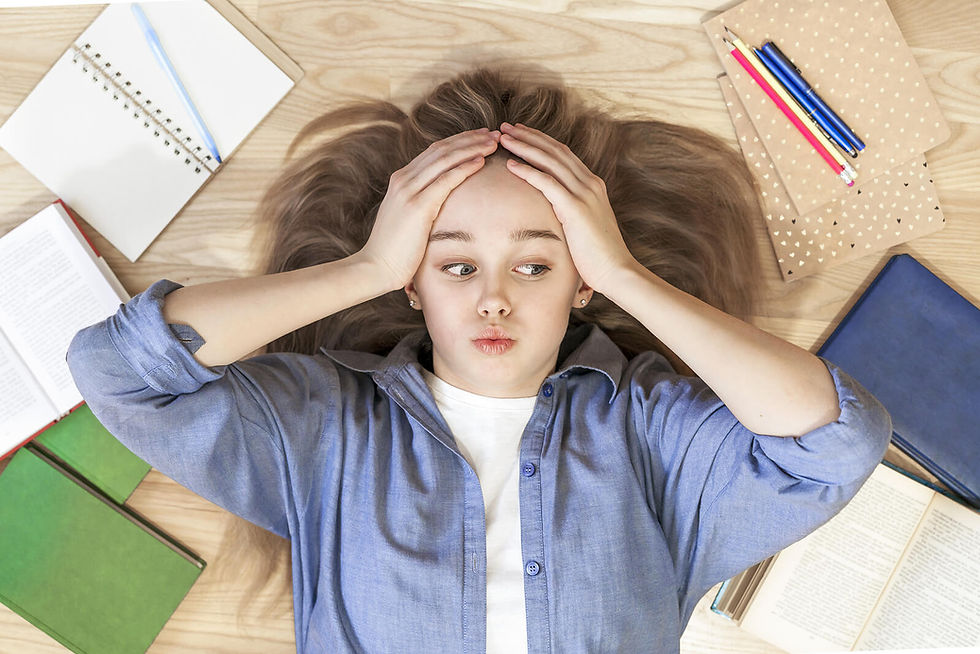How to Combat Seasonal Depression and Anxiety in the New Year: 6 Tips
- Liz Morrison, LCSW
- Feb 14, 2023
- 5 min read

With the darkest days of winter upon us, many people are feeling the winter blues. And this winter has been particularly brutal: plummeting temperatures, snowstorms, and travel difficulties have greatly impacted New Yorkers. All this, plus the typical lack of sunlight and shorter days, can wreak havoc on mental health.
Many of our clients at Liz Morrison Therapy struggle with seasonal depression and anxiety during this time of year and don’t know what to do about it. If you have a hard time getting through the colder months, you’re not alone. But despite the challenges, there are ways to cope. So let’s talk about why seasonal depression can be so tough, and what you can do about it.
What Causes Seasonal Depression and Anxiety?
Seasonal depression and anxiety impact up to 10% of the US population. Depression during the colder months is more common among young adults than older adults, and it affects women more frequently than men.
Seasonal depression can severely impact things like:
Ability to sleep
Mood
Energy
Thought patterns
Weight
Food cravings
Relationships
So what causes seasonal depression and anxiety? One big factor is reduced sunlight. This causes decreased production of serotonin, melatonin, and Vitamin D in the body. Serotonin is a brain chemical whose absence is associated with depression. Melatonin helps you fall asleep at night. And Vitamin D is also widely considered to play a role in mood stabilization.
In other words, low light can disrupt your body chemistry, mental health, and circadian rhythms. It can make it much harder to fall asleep at night. And low-quality sleep can make ongoing mental health issues even worse.
Of course, there are other factors in seasonal depression as well. After the rush of the holidays, opportunities to socialize may be few and far between. Or you may not have cultivated many winter hobbies. And if you’re feeling isolated, lonely, and disconnected, you’re more likely to be depressed.
Anxiety is common during colder months, too. Reasons for this vary, but many young clients we see have similar triggers. If you’re someone who has a hard time resting or slowing down, you might feel anxious during the winter. Weather-related anxiety is also common. Plus, holiday stress and family strain can fuel both depression and anxiety in many people.
Ways to Cope With Seasonal Depression and Anxiety
Seasonal mental health struggles are challenging to navigate, but there are ways to feel better. Here are 6 tips for coping with seasonal depression and anxiety in the new year.
Have compassion for yourself. It can be easy to get frustrated at yourself for feeling low. It’s common to get into the habit of beating yourself up for feeling depressed or anxious. But adding guilt and shame on top of everything else doesn’t help your depression go away, and it certainly won’t make you feel better. Imagine if a dear friend or family member was struggling in the same way you are. You would probably feel empathy, love, and compassion for what they were going through, right? So try to tap into self-compassionate thoughts toward yourself just like you would with them. It can help to journal in the third person with a prompt like, “What would my most compassionate self want me to know right now?” Or you can imagine yourself as a small child and talk to that child directly.
Listen to your body – and get curious. Your needs and desires might be different when you’re dealing with seasonal depression and anxiety. And that’s okay. Maybe you need more sleep, more cozy nights in, a different exercise routine, or less stimulation than usual. Listening to your body can bring up surprisingly difficult emotions, especially if you feel like your own needs are inconvenient or not worth tending to. These difficult emotions are okay, too. Get curious about them. Are they trying to protect you from something? What might they be trying to express? Remember to be compassionate toward yourself through whatever comes up.
Make meaningful connections. Socializing can feel really hard when you’re struggling with seasonal depression and anxiety. But spending time with loved ones boosts serotonin and mood. And maintaining your friendships and community connections can give you a sense of purpose and help dispel feelings of loneliness and isolation. Try to connect with others in ways that feel good for you when you have the capacity. That might look like asking a friend over for tea, going to a yoga class with a friend once a week, volunteering at your local soup kitchen, or offering to take the neighbor’s dog for a walk.
Consider supplements and medication. Prescription medication, Vitamin D supplements, and tools like light boxes can go a long way in combating the chemical effects of low sunlight. There’s absolutely no shame in needing external sources of support. And in fact, effective treatment of seasonal affective disorder commonly includes all of these. Talk to your healthcare provider to discuss which treatments might be right for you. And don’t be afraid to advocate for yourself. You know your body best, and you can speak up and ask for something specific if you think it might help.
Don’t “should” yourself. Depression isn’t something you can force away. Saying things like, “I should be able to be more productive” or “I should be able to just enjoy my life and stop feeling so miserable” only make you feel worse about yourself and your situation. There’s nothing wrong with you for feeling the way you feel. If you don’t know how to cope with seasonal depression on your own, there’s no shame in that. That’s what help and support are for.
Seek support. Asking for help can normalize what you’re going through. You might be surprised to find that the people close to you are also struggling. Reaching out to others can help you connect and feel less alone. Talk to close friends or family about what you’re going through. And consider working with a trained therapist. Therapy is widely considered one of the most helpful treatments for seasonal depression and anxiety.
Want Support With Your Seasonal Depression and Anxiety? Consider Therapy
If you don’t know how to overcome feelings of depression and anxiety on your own this winter, we’re here to help.
We offer therapy for teens in New York. We will work with you to help navigate difficult emotions, figure out how to change unhelpful ways of thinking, and come up with tailor-made coping strategies to help get you through the cold, dark days.
Feel free to get in touch with us for a free 15-minute phone consultation. We can answer any questions you have, see whether we’re a good fit, and start working toward a better future today.




